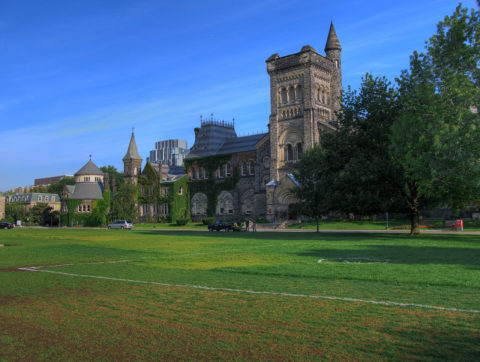Yuan Yu Zhu explains why Canada, despite its huge geographical spread, is ruled almost exclusively by people drawn from a very small, very incestuous ruling class:

University College, University of Toronto, 31 July, 2008.
Photo by “SurlyDuff” via Wikimedia Commons.
Unlike many countries’ socio-political elites, the Laurentians are not readily identifiable on sight. They have long abandoned their differentiated mid-Atlantic drawl; their houses do not have moats.
What distinguishes them above all else is the uniformity in their outlook. Britain is often said to be run by a consensus blob; but its Canadian equivalent make the Westminster blob seem positively anarchical.
As John Ibbitson, the great chronicler of the Laurentian elite, has written:
Although they often disagree among themselves, they share a common set of assumptions about Canada: that it’s a fragile nation; that the federal government’s job is to bind together a country that would otherwise fall apart; that the biggest challenge is keeping Quebec inside Confederation; that the poorer regions must forever stay poor, propped up by the richer parts of the country; that the national identity — whatever it is — must be protected from the American juggernaut; that Canada is a helpful fixer in the world, a peacekeeper, a joiner of all the best clubs.
Latterly they have added to this list the belief that Canada is a genocidal state built on stolen land, which should atone for its past through part-performative truth and reconciliation – without, however, actually giving any of the stolen land back. It is perhaps unnecessary to add that they are almost all small-l and/or big-L liberals.
This is not to say that their class background (in a country whose official ideology denies the existence of such a thing) is not highly homogenous. They are generally to be found in the two or three large cities of Ontario and Quebec. They tend to be from the upper-middle class families and be secularized.
Many will have been educated in the same private secondary schools; most will have attended a smattering of universities in Ontario and Quebec: the University of Toronto, Queen’s, and McGill (which Johnston headed when Trudeau was a student there).
A large number of them are bilingual, in a country where real bilingualism remains the exception.
Many have post-graduate degrees, often from abroad; something like a quarter of Mr Trudeau’s cabinet ministers have degrees from Oxbridge alone, a shocking figure given how uncommon they are among the population at large.
They then tend to gravitate into the same professional occupations, and they even live in the same few neighbourhoods in the same few cities. Sometimes, like the prime minister and his special rapporteur, they even end up sharing adjoining vacation cottages literally in the Laurentians region.



